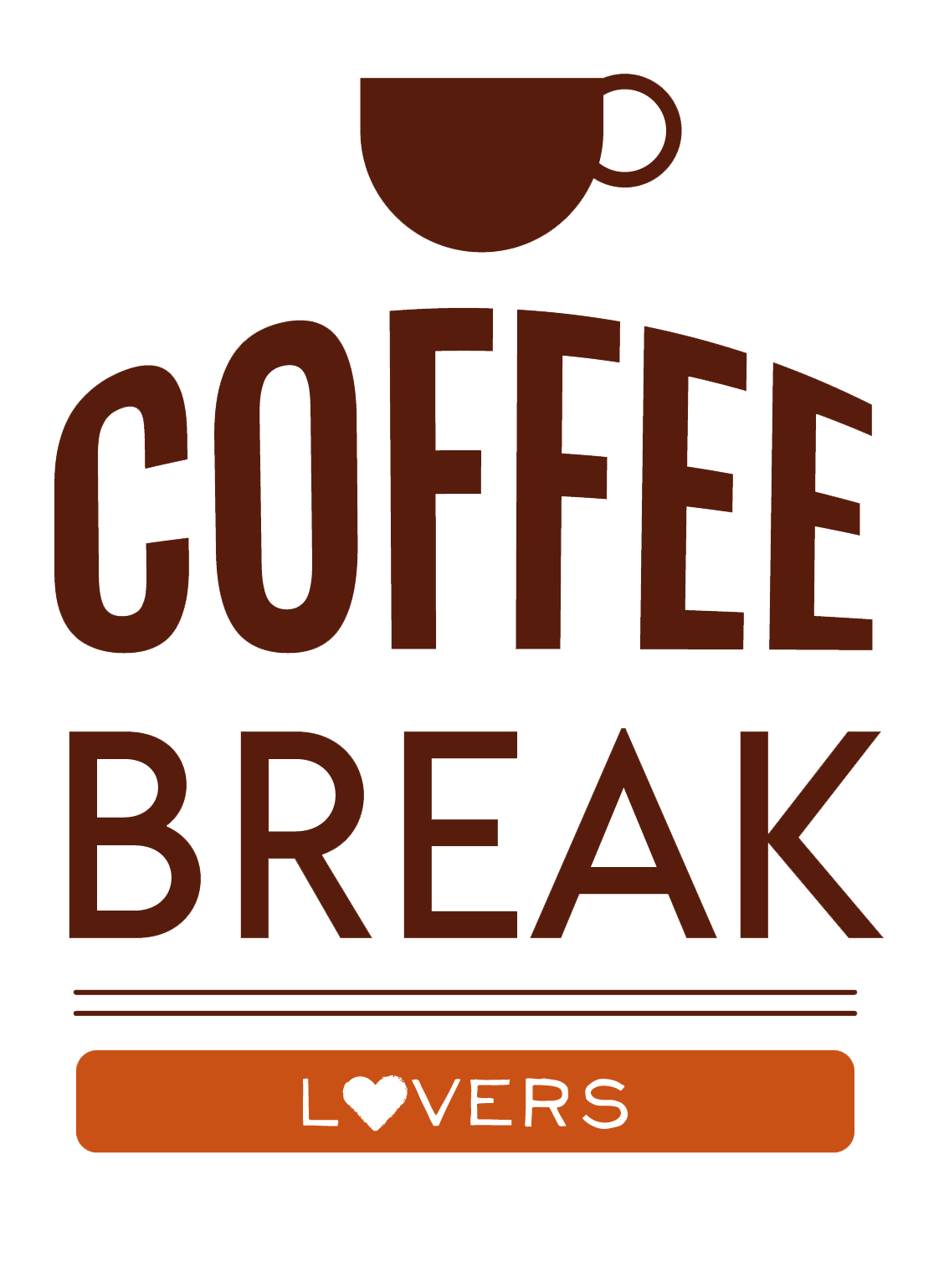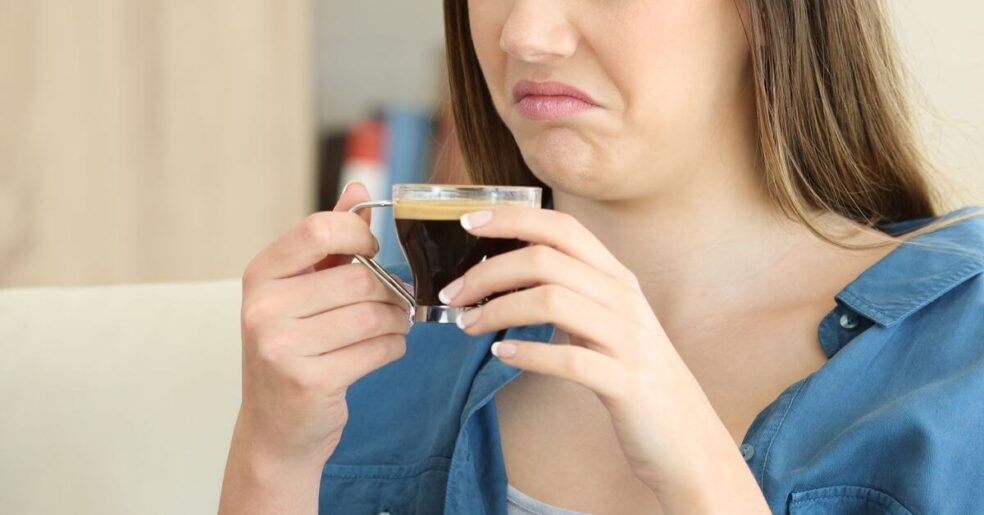Despite your best efforts, a cup of French Press coffee won’t always taste as delicious as you’d hoped. So, what went wrong and why does your French Press coffee taste bitter?
In general, French Press coffee becomes bitter due to over-extraction. There are several reasons this can happen, but the three most common are that the water was too hot, the grinds are too fine or the coffee was allowed to steep for too long.
Fixing one (or all) of these issues should improve your coffee, but there are several other things you should watch for as well.
Why Is My French Press Coffee Bitter?
French Press coffee is usually bitter because of over-extraction. This occurs when too much of the coffee’s soluble flavors were dissolved into the water.
The reason over-extraction makes coffee bitter is that different parts of the coffee are extracted at different times.
- First, fats and acids are extracted from the coffee bean.
- Second the coffee’s sugars are pulled out.
- Finally, plant fibers inside the bean will start to dissolve.
And it’s these plant fibers that will give your coffee that bitter, dry and hollow flavor associated with over-extracted coffee.
So what are you doing that makes your coffee turn out like this?
- Either the brewing time is too long
- the water temperature is too hot,
- you used too many grinds,
- or the grind size is too small
Let’s take a closer look at each one of these and see how you can fix it.
Your Coffee Will Be Bitter If It Brews For Too Long
Your coffee will keep extracting as long as the beans are in contact with the water. So, if you let it sit long enough, the plant fibers in the bean will start to break down and your coffee will become bitter.
To prevent this from happening, use a timer to keep track of your brewing time. For the French Press method, 4 minutes is the typical brewing time.
Also, remember to remove all of your coffee from the French Press after it’s done brewing. (To read more about this, check out our post “Can You Leave Coffee In A French Press?“)
Water That’s Too Hot Will Make Your Coffee Bitter
Heat affects how fast something dissolves. So the hotter the water, the quicker your coffee will extract.
To achieve the ideal extraction rate, your water should be between 195°F and 205°F (90°C – 96°C).
Sounds easy enough, right?
The thing is, most coffee drinkers don’t take time to measure the water temperature. Instead, we just boil the water and start brewing.
However, if you believe your water might be too hot try this – take the water off the heat once it starts boiling and let it cool for about 30 seconds. Then go ahead and brew.
Related Post:
A High Coffee To Water Ratio May Make Your Coffee Bitter
If you’re using too many coffee beans for the amount of water you have, your coffee may be over-extracted and bitter.
But how much coffee is too much?
Well, you may have heard that it’s best to use 2 tablespoons of coffee for every 6 ounces of water. The National Coffee Association has said it, we’ve said it, and various others have said it.
And while this is the best ratio in most cases, you may want to change this a bit for French Press coffee.
If your coffee is too bitter, put away the tablespoons and try measuring out 1 gram of coffee for every 15 grams of water instead.
Not only is 1:15 much less coffee for the amount of water, but since grams are a unit of weight (instead of tablespoons and ounces which are measures of volume), your measurements will be more precise.
If you’re in the market for a coffee scale, you can check out the Kitchen Tour Coffee scale on Amazon.
Kitchen Tour Coffee Scale With Timer
Finely Ground Beans May Make Your Coffee Bitter
Finely ground coffee will extract faster than coarsely ground coffee. So, if your grinds are too small that could contribute to the bitter taste.
When using a French Press, medium/coarse or coarse grounds should be used. This will prevent your coffee from over-extracting too quickly and becoming bitter. It will also prevent your filter from getting clogged with fine grinds.
So, if you prefer pre-ground coffee, look for a coarse grind. If coarse isn’t available, your best option will be to buy whole beans and grind your coffee at home.
If you don’t have a grinder, we normally use our budget-friendly Mr. Coffee grinder or you can pick up a manual burr grinder like JavaPresse for a more controlled grind.
JavaPresse Manual Burr Coffee Grinder
Other Reasons Your French Press Coffee May Be Bitter
If you’re asking “why my French Press coffee is bitter?” over-extraction is the #1 reason, but it’s not the only reason.
Other factors could also contribute to bitter coffee such as:
- poor water quality,
- poor quality coffee beans, and
- stale coffee beans
Let’s take a quick look at each of these scenarios and see what’s going on.
Related Post:
Poor Water Quality Can Make Coffee Bitter
You can’t make good coffee without good water. And while using tap water may seem like no big deal (after all, you’re going to boil it) it can actually make your coffee bitter.
Depending on where you live, your water may be hard and contain a lot of calcium or magnesium. These minerals will interact with your coffee and actually cause more flavor to be extracted.
That doesn’t sound too bad, right?
Sure, to an extent more flavor is better, but that extra extraction can cause your coffee to become over-extracted and bitter far more easily.
Instead of water from the tap, try using distilled bottled water or filtered water.
Poor Quality Beans Can Make Coffee Bitter
Not every coffee bean is created equal. Some beans are grown in high altitudes, in nutrient-dense soils, and under ideal climate conditions. These beans, typically come with a premium price tag.
But if you usually look for low-cost options, you may be getting lower quality beans. These cheaper beans carry fewer nutrients, have more defects, and probably weren’t ripe when they were harvested.
In short, your coffee’s flavor will be of lower quality.
And to cover up the poor quality, roasters will roast these beans darker than normal which also contributes to your coffee’s bitterness.
Stale Beans May Make Your Coffee Bitter
As roasted coffee beans age they start to oxidize. And this causes the flavors (acids, sugars, and oils) to break down or go rancid.
So when you actually go to brew your coffee, you’ll get minimal desirable flavors and the bitter plant fibers will start to extract much quicker than if your beans were fresh.
To prevent this,
- buy whole beans,
- use them within 6 months and
- store them in a cool, dry, airtight container
But if you still want to buy pre-ground, use them within 2 weeks to make sure they’re as fresh as possible.
Pressing The Coffee Causes Additional Extraction
When you press down on the plunger, the water and coffee grounds are agitated. This movement causes just a bit more solubles to be extracted from the grounds.
It’s unlikely that this by itself would cause your coffee to become bitter, but it can contribute.
If your coffee is usually bitter, don’t press the plunger. Instead, allow the coffee grounds to steep and place the mesh filter just on the surface of the water.
Then, when your coffee is done brewing, leave the filter on the water and simply use it as a strainer when pouring your coffee.
An Unclean French Press Can Add Bitterness
A dirty French Press can also contribute to bitter coffee. Coffee grinds and oils from previous brews will add additional plant fibers and the flavor of rancid oils to your coffee.
So, make sure you clean your coffee maker after each use to prevent this.
Related Posts:
- Should You Tamp Moka Pot? Here’s What You Need To Know!
- Why Does Moka Pot Sputter? ( An 6 Ways To Fix It)
- When To Take Moka Pot Out Of Heat ( Get The Perfect Brew!)
- Can a Moka Pot Explode? Top Security Tips Before Brewing!
The Beans May Not Meet Your Expectation
You may feel that your coffee tastes bitter, but if you’re drinking
- dark roast or
- a blend of robusta and arabica beans
your coffee may taste exactly how it’s supposed to.
Dark Roast Coffee May Taste Bitter
Many dark roasts are usually described as having a “smoky” or “dark chocolate” flavor.
But if you’re not accustomed to drinking dark roast, you may not see any difference between “smoky” or “burnt” or “bitter”.
If this is the case, consider switching to a lighter roast. You’ll be able to enjoy more of the bean’s natural flavors and get less of the roasted flavors.
Robusta Beans Are More Bitter Than Arabica
Robusta coffee beans are known for being harsh, bitter, and strong. And while few coffees contain 100% robusta beans, many are blends of robusta and arabica.
Blends don’t usually disclose the percentages, so you won’t know if you’re drinking 20%, 50%, 70% robusta, or higher. This could cause one brand to be more bitter than others.
If you’re drinking a blend and it’s more bitter than you expected, try switching to a brand that’s 100% arabica. Your coffee should be considerably sweeter and smoother.
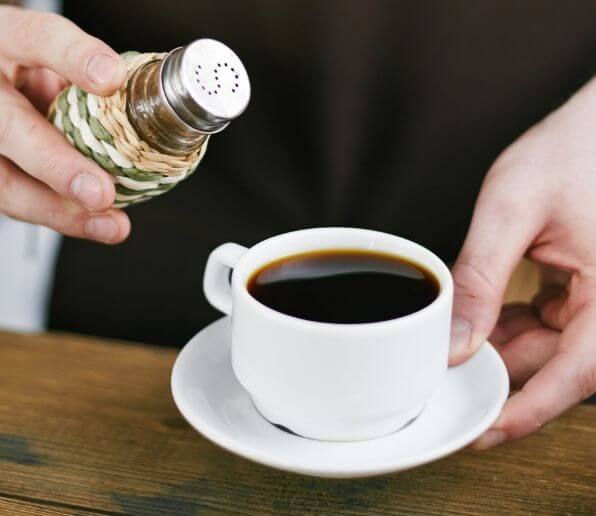
Adding Salt Will Cut Your Coffee’s Bitterness
One final tip to cutting your coffee’s bitterness is to add a pinch of salt to your coffee.
You can either mix a little bit of salt in with your coffee grounds before brewing, or you can add a pinch to your brewed cup of coffee.
The reason this works is that the sodium ions in salt bond to the salt receptors on your tongue and dampen your perception of bitterness.
So if all else fails, consider adding a pinch of salt to your coffee to reduce the bitterness.
Related Post:
Key Takeaways
- Coffee is typically bitter because of over-extraction
- You can reduce extraction by using coarser grinds, cooler water or a shorter brew time
- Use distilled water and fresh, high quality beans
- Consider trying a lighter roast or buying 100% arabica beans
- Add salt to your coffee
Cheers Coffee Lovers!

KEEP READING
- Double Brew Coffee: How To Brew The Perfect One!

- Pour Over vs Drip: Which Is The Better Brew?
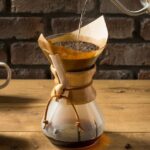
- Coffee Espresso Temperature. Here’s What To Do To Brew A Unique Cup!

- Full Bodied Coffee: A Richer, Thicker, And Delicious Cup Of Coffee!

- Why Do French Presses Explode? (And How To Prevent It)
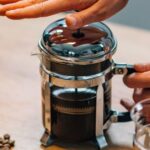
- Is Cuban Coffee Stronger Than Regular Coffee? Proof Inside!
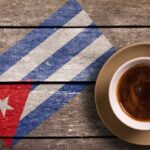

Idalmis is co-owner of Coffee Break Lovers. She is a Cuban coffee enthusiast that is passionate about coffee and coffee culture.
